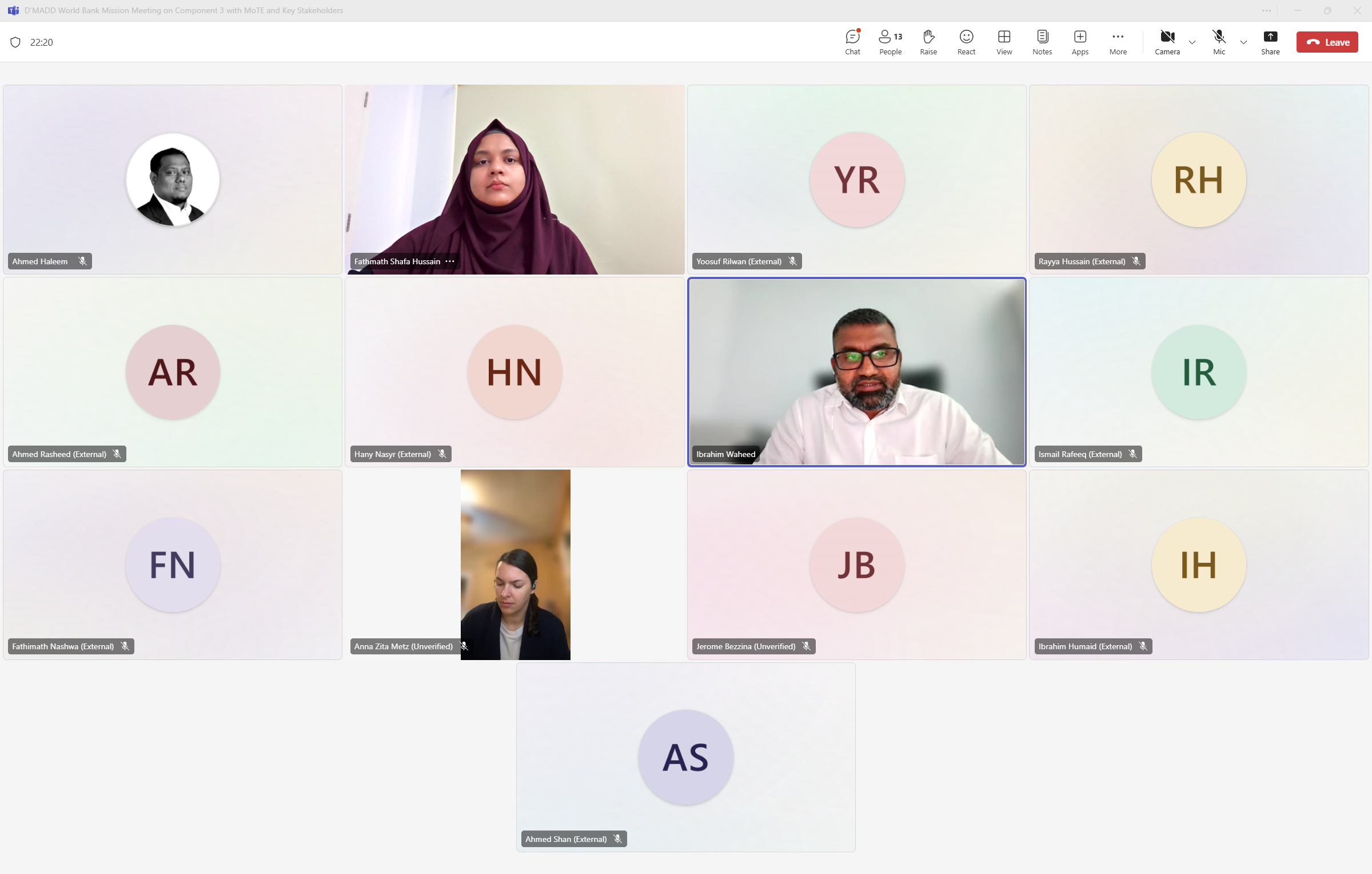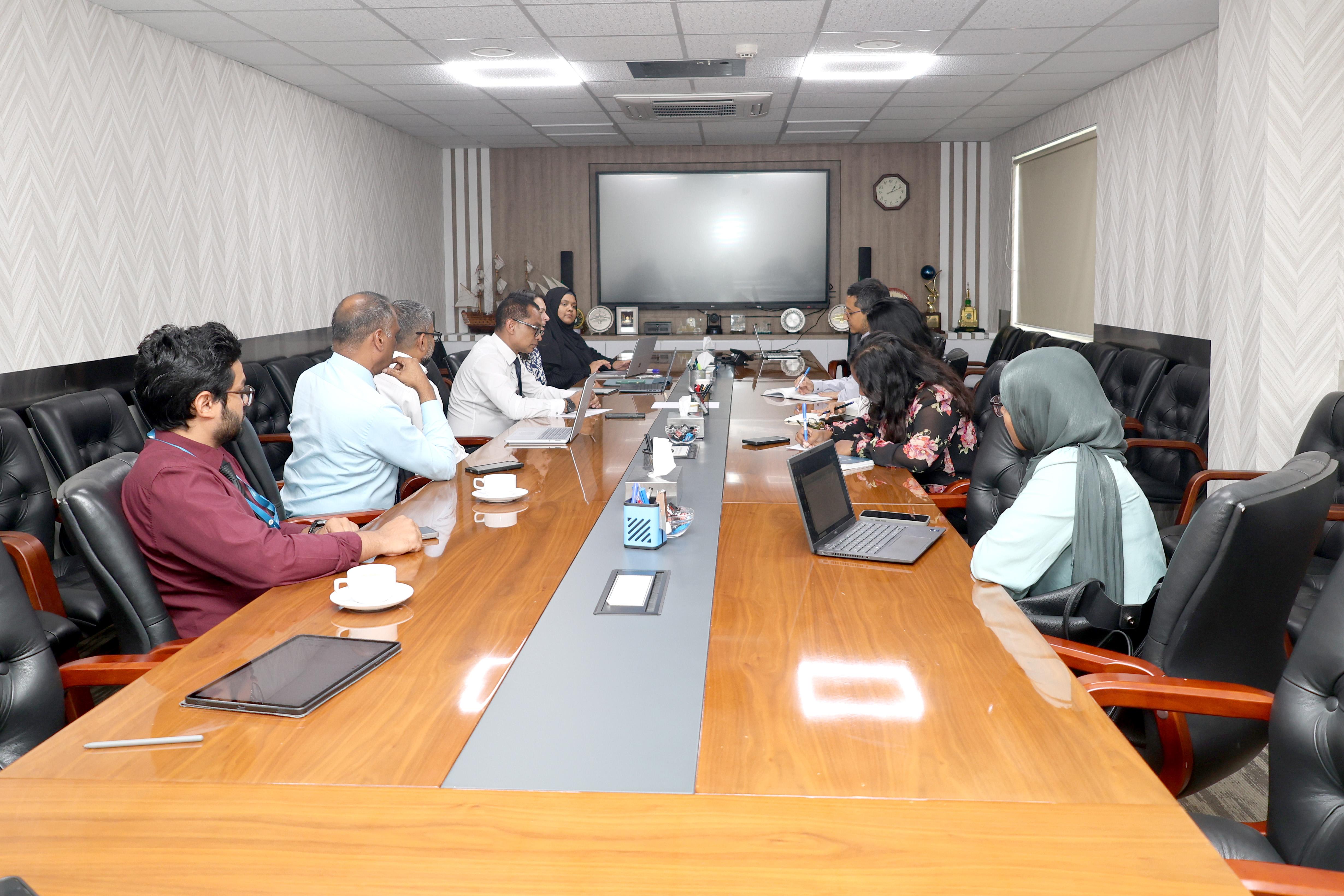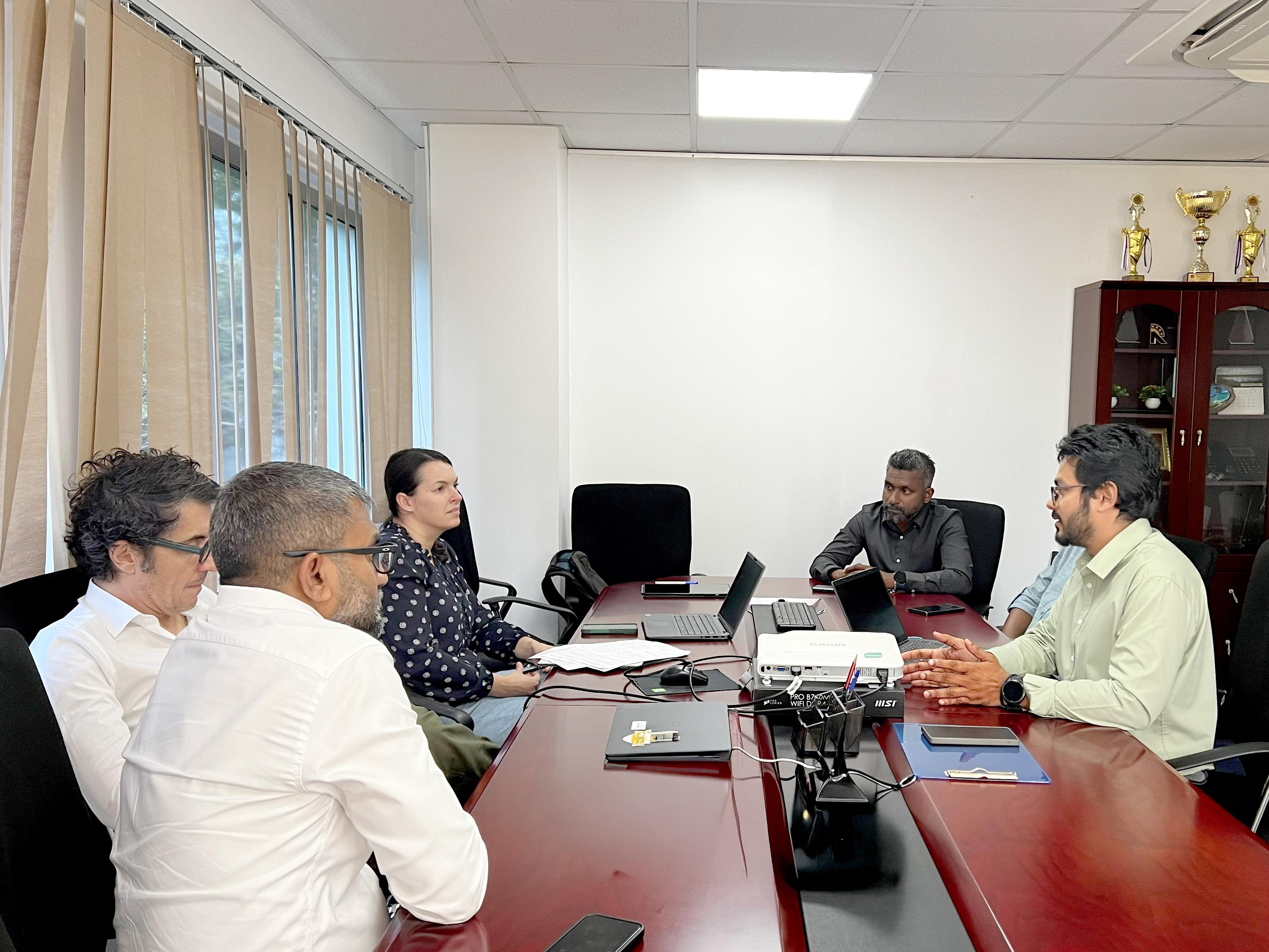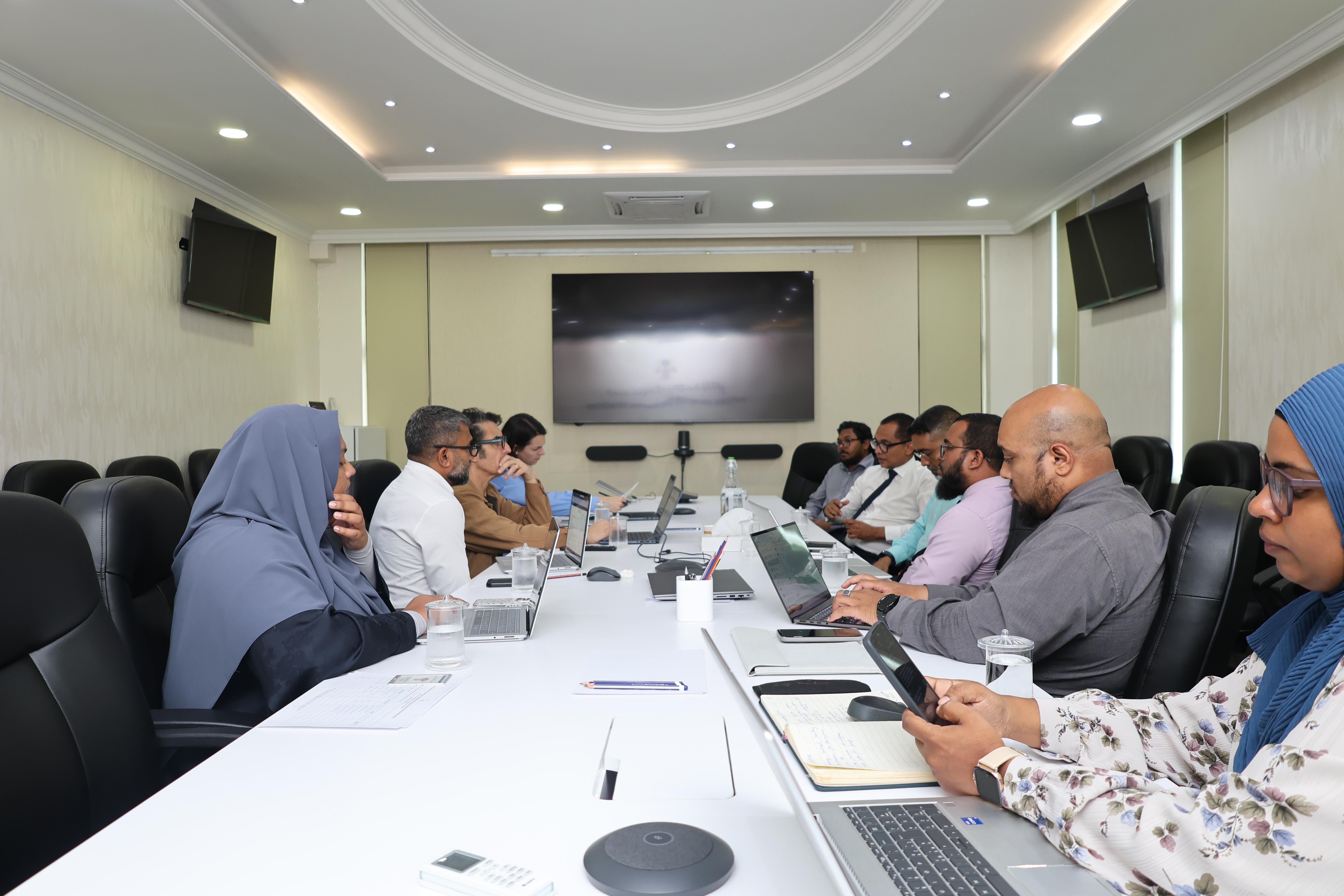News
The World Bank Virtual Mission Meets with MOTE
15 April 2025

Co-Task Team Leaders from the World Bank, Mr.
Jerome Bezzina (Sr. Digital Development Specialist and Ms. Anna Metz (Sr.
Digital Development Specialist) and Siew Sanz Ng (Young Professional) from the
World Bank met with the Ministry of Tourism and Environment (MoTE), Environmental
Protection Authority (EPA), Maldives Meteorological Service (MMS), the
Fuvahmulah City Council and the National Centre for Information Technology
(NCIT).
Ms. Rayya Hussain (Environment
Analyst, Environment Management and Conservation Department), Mr. Ahmed Shan (Senior
Surveyor, Environment Management and Conservation Department), Ms. Fathimath
Nashwa / Assistant Director, Climate Change Department, Mr. Ahmed Masoon (Programme
Officer, Climate Change Department), Ms. Hazlee Hameed (Program Officer, Water
and Sanitation Department), Aishath Nafua (Environment Research Officer, Water
and Sanitation Department). From the Environmental Protection Agency, Mr. Yoosuf
Rilwan (Director, Environment Research and Conservation) participated in the
meeting. The MMS was represented by Mr.
Ahmed Rasheed (Director, Program Research and Advocacy) and Mr. Ibrahim Humaid (Seismologist).
Mr. Ismail Rafeeq (Mayor) and Mr. Ahmed Ibrahim (Director) represented the
Fuvahmulah Council. Hany Naseer (Senior Software Engineer) joined from the
NCIT.
Dr Waheed started the meeting by
highlighting the completed capacity building program that was conducted with
the assistance of the World Bank DRM through a trust fund connected to the
establishment of the Multi-Hazard Early Warning pilot program underway in
Fuvahmulah City by the D’MADD project. He then updated the participants on the
progress of the pilot. He highlighted that compiling the specific data of
Fuvahmulah required for the MHEW system is a challenge. These include socioeconomic
and demographic data, along with meteorological data. The Mayor, Mr. Ismail
Rafeeg, also weighed in on the issue and assured that he is actively engaged in
obtaining the data from relevant authorities. Dr. Waheed briefed on the work
done with the World Bank DRM team to obtain additional funds through the trust
to establish a control centre; however, it did not yield any success because it
is not covered in the scope of the trust fund. However, once completed, it will
have an active control room with limited infrastructure established within the
city council and will share data with relevant authorities. The system will
also provide a mobile app for the public.
The World Bank discussed
institutional communication strategies with Bangladesh, Pakistan, and
Afghanistan, and the pilot is increasing its visibility among the neighbouring
nations. Their disaster risk management teams are interested in the pilot's
outcomes.
The Maldives Meteorological
Service highlighted the additional observation systems planned for the island,
which can complement the early warning system. They also briefed on the RIMES
project by them, which is similar in nature. Dr. Waheed emphasized on
collaboration and avoiding duplication of resources. Dr. Waheed also clarified
a question on the support beyond the project. The current cost includes a 3-year
licensing and support period after the pilot completion, provided by the
consultant. This was discussed and agreed upon to ensure the continuity and
maintenance until the government can take over.
The discussion then moved on to
the Passive Acoustics Monitoring pilot. The EPA team briefed on the current
situation and expressed their satisfaction with the pilot. The EPA team, along
with the Maldives Marine Research Institute, Maldives University, and members
of civil society, were being trained to use the technology.
Dr. Waheed also briefed on the
final pilot of using Fluid Lensing technology. The pilot is experiencing external
challenges. These challenges include international trade tariffs,
weather and permits. The mission team from the World Bank highlighted that they
will also investigate the matter with the Maldives Country office. The Ministry
of Tourism and Environment inquired about the alternative if the pilot cannot
proceed. The World Bank team highlighted that as long as the pilots use novel
technologies, an alternative plan can be discussed.
The teams then discussed the
update on the Data Platform for climate action, where the roadmap has already been
developed, and the procurement stage is ready to begin for the consultancy
component. The roadmap was developed by a trust fund established by the World
Bank. Project Manager Dr Waheed explained the following steps and plans for the
component. He also highlighted the hosting of the platform, whether it will be
locally hosted at the National Data Centre or an alternative option.
The team from NCIT committed full
support to host, based on the consultants’ requirements. The World Bank advised
considering options that the hosting can be sustained beyond the project.
The Ministry of Tourism and
Environment highlighted that most of their 13-year data was lost during the
major fire incident, and they have concerns about whether the data can be
provided within the remaining two years of the D’MADD project. However, if the
platform is a system that compiles and presents data, then there is no issue.
The ministry had no concern about where the platform is hosted, as long as it
has access. They also shared their previous experiences with similar projects
that were not sustained after the project ended. Dr Waheed noted that he will address
the Ministry’s concern about the limited data and work with the consultants and
the Ministry to determine where and how the existing data can be obtained.
To conclude, Dr. Waheed provided
an overview of how the pilot projects and data Platform for Climate Action,
under component 3, closely aligned with one of the pillars of the Maldives 2.0,
as sectoral technology and innovation were emphasised. The D’MADD project is
also contributing to the broader view of the digitalisation of the Maldives,
introducing pilot projects that involve the use of novel technologies and
innovations, as well as climate resilience and environmental protection.


